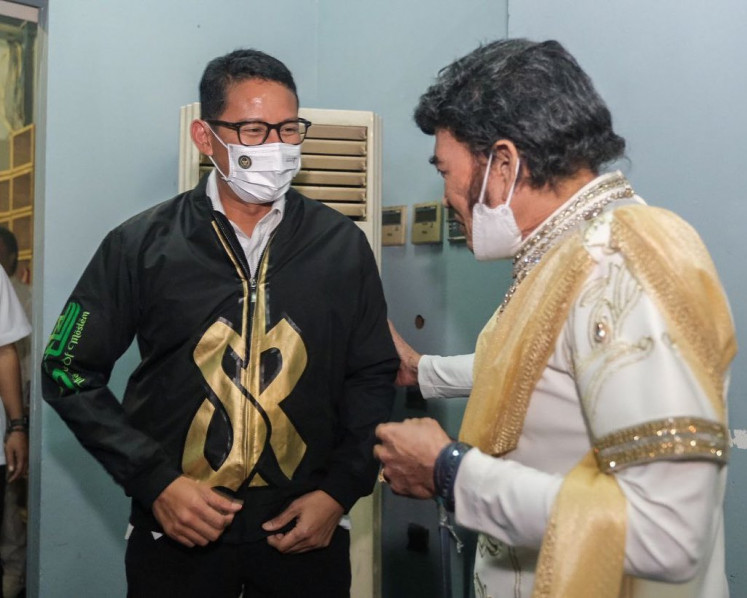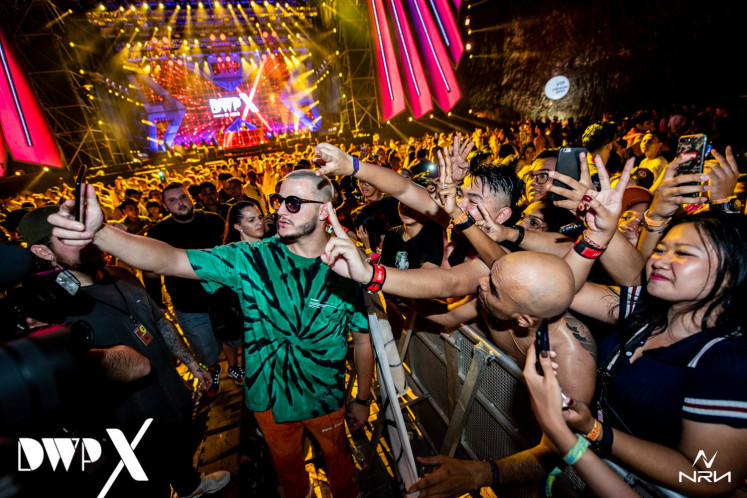Popular Reads
Top Results
Can't find what you're looking for?
View all search resultsPopular Reads
Top Results
Can't find what you're looking for?
View all search resultsInsider view: Will local music festivals make triumphant return this year?
The brief return of live, in-person concerts in late 2021 led some to speculate that the country will celebrate the return of music festivals this year, but others remain skeptical.
Change text size
Gift Premium Articles
to Anyone
T
he brief return of live, in-person concerts in late 2021 led some to speculate that the country will celebrate the return of music festivals this year, but others remain skeptical.
Flashing lights, blaring speakers and masses of color. The image is familiar to the millions who have longed for their return for nearly two years now.
“Music festivals are all about celebration. That’s why it’s harder for them to make a comeback,” said Rizky Aulia, better known as “Ucup”.
If anyone knows anything about the huge effort and resources it would take to organize a music festival in these trying times, it’s him. Ucup has had a hand in founding some of the country’s hippest festivals and has a finger firmly on the industry’s pulse. But when faced with the inevitable question, even an optimist like Ucup becomes skeptical.
“The return of music festivals is still very much a gray area,” he said. “People are just waiting for a trigger, then things will set off.”
When the COVID-19 pandemic hit the country in March 2020, its bustling music industry ground to a halt. As amplifiers and drum sets gathered dust in a corner backstage, musicians and promoters who rely on touring for the bulk of their incomes also found themselves in a corner.
Facing imminent financial ruin and an uncertain future, industry insiders say that the forced hiatus has gone on for far too long. Something has to give, and soon.
Canceled hopes
It was only late last year that industry players saw a dim light at the end of the tunnel. COVID-19 numbers went down, public restrictions were eased and music promoters sensed a rare opening.
“The demand was big, and it has persisted,” recalled Wendi Putranto, program director and cofounder of M-Bloc, arguably Jakarta’s top up-and-coming cultural venue.
“People felt better about going to concerts because the [coronavirus] case numbers were going down and the media were keeping things conducive,” he said.
In late November 2021, M-Bloc hosted sold-out concerts of indie superstars Kunto Aji and Hindia. Electro-pop crooner Pamungkas also pounced on the chance, announcing a monthlong, 12-city tour across Java that would end in December.
Greetings: Minister of Tourism and Creative Economy Sandiaga Uno (left) talks to dangdut legend Rhoma Irama (right) backstage at a gig in Jakarta, in December 2021. (Instagram/Courtesy of Sandiaga Uno)Then, a statement concert was held on Dec. 20, featuring “dangdut king” Rhoma Irama and his lavish backing band Soneta sharing the stage with hard rock legends God Bless. Tourism and Creative Economy Minister Sandiaga Uno came to the venue, his escorts in tow, posing for pictures with Rhoma while “ensuring the procedures and health protocols were followed”, according to his social media post that night.
The two musical pantheons capped a glorious night as thousands danced, and it seemed the sky was the limit.
“The enthusiasm was crazy,” recalled Ucup, who masterminded that concert under the banner of his new event organizing company, Boss Creator. “People really missed going to concerts.”
These one-off concerts and low-key, stripped-back tours were considered the “dress rehearsal” before the real thing returned: large-scale music festivals. Opportunities abounded during this small sliver of hope, even for smaller collectives and independent organizers with tight budgets and even tighter space for errors.
“The paths were already open for [independent] promoters to bring musicians, even from abroad,” said Argia Adhidhanendra, cofounder of music promoter collective Noisewhore. “But then the new variant [Omicron] dropped, and bands worldwide began canceling their tours.”
That was when the wave of hope broke and rolled back. The caseload grew after the festive period and Jakarta imposed the level 2 public activity restrictions (PPKM), worrying industry insiders.
“If it got to level 3, all cultural and arts events will be banned by the central government,” said Wendi of M-Bloc. “For promoters, it was too much of a gamble.”
But the ball was already rolling. “As far as I’ve heard, a lot of music festivals are already plotting a comeback for after Idul Fitri,” said Ucup, referring to the major Muslim holiday that falls in May this year.
“There are even rumors going around about which artists will be coming from abroad. You’ve got people saying this band is playing here, another band is playing a stadium opening and a lot more.”
There is a sense that many industry players are too restless to bear another enforced shutdown.
“We do have plans for organizing an offline music festival this year,” said Pratista Ayu of marketing and promotions at events behemoth Ismaya Live. “There’s a huge demand from the Indonesian audience for the return of offline music festivals.”
“Foreign bands and booking agents are targeting Indonesia because they think we’re a loyal, consumptive market with buying power that defies logic,” Ucup emphasized. “Indonesia is like someone who has been fasting for a long time. [The audience] is hungry, and they’ll eat up anything.”
Cautionary voices
Some quarters, however, don't share Ismaya Live’s relentless drive or Ucup’s optimistic outlook.
“The capital is there, sponsors are sensing an opportunity and the audience’s appetite is big,” said Argia. “But right now, the market is the only argument for festivals to return. There’s a ton of hurdles and the only counter to that is to say that the promoters and audience want that to happen.”
There are ethical reasons for caution, of course, but more practical issues, too. Although the government recently reduced the 10-day mandatory quarantine for all overseas travelers to 7 days, booking agents had begun to have second thoughts about sending their artists to Indonesia.
Insiders say: Artists from abroad are battling to return to Indonesia, yet they are put off by stringent quarantine rules. (Courtesy of Ismaya Live) (Personal Collection /Courtesy of Ismaya Live)“Even if the band really wants to come, their booking agent will shoot that idea down,” said Wendi. “There’s no way they’ll let their band spend seven days in Indonesia just to quarantine.”
Ucup acknowledged that the country’s quarantine rules were a major stumbling block for international bands. “It’s the main concern for booking agents,” he conceded. “They don’t really consider the pandemic [as an issue]. It’s just the quarantine rules. If [the band] has to stay in a hotel and quarantine for a week, that’s time that could be spent touring several countries.”
This also means that no one else aside from heavyweight promoters can afford inviting a foreign band.
“For high-tier acts, it’s possible for them to come as a one-off [show],” Argia says. “But that’s not going to happen in the case of up-and-coming artists who are on an intense touring schedule.” Doing so would simply be economically unfeasible for the artist, booking agent and promoters alike.
Wendi was also worried that the recent spike in cases would make sponsors more cautious about supporting concerts and festivals.
“Festivals are guaranteed to attract a crowd, and Omicron spreads like wildfire,” he said. “Promoters must be concerned that their shows could become new clusters of infection.”
They would likely hold back, he continued, which would close the curtain on most music promoters who were still reeling financially from almost two years of forced inactivity.
“There’s still a huge reliance on sponsors here,” Wendi underlined, adding that without sponsor funding, even the industry heavyweights would struggle to stay afloat.
Finding the middle ground
For Ucup, it all hinges on the government providing clarity. “The government needs to explicitly say that [music festivals] are allowed and under what conditions they can be [held],” he says. “As long as [the government] remains silent, there’s a sense that these promoters are defying the law.”
He points to Pamungkas’ year-end tour and the upcoming Joyland Festival, a music festival to be held in Bali in February, as examples of what could be done with support and clear guidance from the government. Both are relatively smaller events that had the blessing of local authorities.
“Even the [tourism] minister has attended my concerts,” Ucup said, praising authorities’ tentative support for the return of cultural events. “But festivals require bigger assurances from policymakers.”
A tourism ministry representative has not responded to The Jakarta Post’s request for comments.
“People in the industry already have their own plans for 2022,” Ucup said. “They’re just waiting on the situation around Idul Fitri. They even have their own plans for ensuring that the health protocols are followed during the festivals.”
Pratista admitted that concerns over health and safety, along with ambiguity over permits, had plunged many well-laid plans into uncertainty.
“We need to know if the government accepts the proposed health protocol plans drawn up by promoters,” she said. “Then, it’s up to us to make sure these protocols are implemented effectively and efficiently.”
For Argia, though, these aspirations seem foolhardy at best and impractical at worst.
“Will there be mandatory testing at these festivals, for example?” he asked. “And if so, how will that affect the costs? How expensive will the tickets be then, and will it make economic sense?”
Jakarta was “70 percent ready” for festivals to return, he noted.
“We have the infrastructure, experienced promoters who are used to strange policies and audiences who are well-versed in the health protocols and understand the importance of mandatory testing. But if Jakarta starts something, I guarantee other cities will follow. Are they just as ready? Will their promoters and local government be as strict?” Argia said.
“We are being relatively healthy as a whole. Do we want to risk what we have now?
“It’s a selfish urge to see shows [in person]. Considering the optics, the logistics and the track record of promoters and regulators, it seems like it won’t be a good experiment.”
For Wendi, the music industry needs to face up to reality and start plotting a more gradual return, focusing on one-off concerts and hyping up long-suffering local musicians instead of forcing grandiose festivals that featured international artists.
“We have to be realistic. It’s time to take small steps,” he said. “At least we’re moving, and we get to keep our sanity.”













